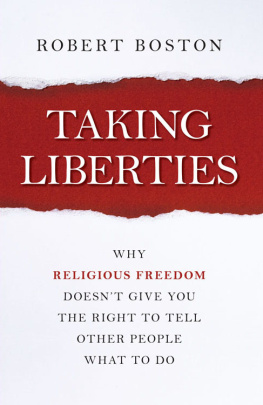Elizabeth Shakman Hurd - Beyond Religious Freedom: The New Global Politics of Religion
Here you can read online Elizabeth Shakman Hurd - Beyond Religious Freedom: The New Global Politics of Religion full text of the book (entire story) in english for free. Download pdf and epub, get meaning, cover and reviews about this ebook. year: 2015, publisher: Princeton University Press, genre: Religion. Description of the work, (preface) as well as reviews are available. Best literature library LitArk.com created for fans of good reading and offers a wide selection of genres:
Romance novel
Science fiction
Adventure
Detective
Science
History
Home and family
Prose
Art
Politics
Computer
Non-fiction
Religion
Business
Children
Humor
Choose a favorite category and find really read worthwhile books. Enjoy immersion in the world of imagination, feel the emotions of the characters or learn something new for yourself, make an fascinating discovery.

- Book:Beyond Religious Freedom: The New Global Politics of Religion
- Author:
- Publisher:Princeton University Press
- Genre:
- Year:2015
- Rating:4 / 5
- Favourites:Add to favourites
- Your mark:
- 80
- 1
- 2
- 3
- 4
- 5
Beyond Religious Freedom: The New Global Politics of Religion: summary, description and annotation
We offer to read an annotation, description, summary or preface (depends on what the author of the book "Beyond Religious Freedom: The New Global Politics of Religion" wrote himself). If you haven't found the necessary information about the book — write in the comments, we will try to find it.
Beyond Religious Freedom: The New Global Politics of Religion — read online for free the complete book (whole text) full work
Below is the text of the book, divided by pages. System saving the place of the last page read, allows you to conveniently read the book "Beyond Religious Freedom: The New Global Politics of Religion" online for free, without having to search again every time where you left off. Put a bookmark, and you can go to the page where you finished reading at any time.
Font size:
Interval:
Bookmark:
Beyond Religious Freedom
beyond
religious
freedom
the NEW GLOBAL
POLITICS of RELIGION
ELIZABETH SHAKMAN HURD
Princeton University Press
Princeton and Oxford
Copyright 2015 by Princeton University Press
Published by Princeton University Press, 41 William Street,
Princeton, New Jersey 08540
In the United Kingdom: Princeton University Press,
6 Oxford Street, Woodstock, Oxfordshire OX20 1TW
press.princeton.edu
Jacket art: An anti-landmine campaign For Every Mine, a Flower
(Por Cada Mina Una Flor) by Sahrawi artist Mohamed Moulud Yeslem, with the berm separating the Polisario Free Zone from Moroccan-controlled Western Sahara in the distance.
Jacket photograph Samia Errazzouki.
All Rights Reserved
ISBN 978-0-691-16609-4
Library of Congress Control Number: 2015935299
British Library Cataloging-in-Publication Data is available
This book has been composed in Sabon Next LT Pro and ITC New Baskerville Std
Printed on acid-free paper
Printed in the United States of America
1 3 5 7 9 10 8 6 4 2
For Ally, Sophie, and Audrey
Contents
Preface
T oday media, scholarly, and policy reports frequently decry a rise in the persecution of Christians and other minorities around the world, and cite a need for religious freedom in response. A 2014 Voice of America article refers to an increase in faith-based hostilities. Although her piece appeared in 2013, several years after I had begun work on this project, Alexanders findings reflect many of the puzzles and unanswered questions about (religious) freedom, persecution, discrimination, and difference that led me to write this book.
Alexander discovered that the Center for the Study of Global Christianity (CSGC) at Gordon-Conwell Theological Seminary in Massachusetts publishes the figure of one hundred thousand Christian martyrs in its annual Status of Global Mission report. To reach this number, she explains, CSGC began by estimating the number of Christians who died as martyrs between 2000 and 2010about one million by their reckoningand divided that number by 10 to get an annual number, 100,000. She puzzles over whether these casualties can legitimately be described as religious:
The majority died in the civil war in the Democratic Republic of Congo. More than four million are estimated to have been killed in that war between 2000 and 2010, and CSGC counts 900,000 of themor 20%as martyrs. Over 10 years, that averages out at 90,000 per year. So when you hear that 100,000 Christians are dying for their faith, you need to keep in mind that the vast majority90,000are people who were killed in DR Congo. This means we can say right away that the internet rumours of Muslims being behind the killing of 100,000 Christian martyrs are nonsense. The DRC is a Christian country. In the civil war, Christians were killing Christians. In earlier estimates of martyrs, CSGC included killings that occurred in the Rwandan genocide. Again this is puzzling. It was not a conflict about religionit was a case of Hutus killing Tutsis, and both sides were Christian. The genocide in Rwanda was based on the systematic killing of an ethnic group in an attempt to completely wipe them out and it had nothing to do with the beliefs or the worship or the people who were killed, says Ian Linden, author of Church and Revolution in Rwanda, and associate professor in the study of religion at the School of Oriental and African Studies in London. The civil wars in the DRC were the consequences of a failed state, disintegrated military force so that militias had almost full power because of the weapons they had. They were indiscriminately killing and raping and plundering and its very difficult to describe any of that killing as creating martyrdom.
Alexander sought out a contrasting viewpoint in the work of John Allen, Vatican reporter and author of The Global War on Christians: Dispatches from the Front Lines of Anti-Christian Persecution . this figure was drawn from the 1982 edition of the World Christian Encyclopedia which estimated that on average 20% of African nations were actively practising Christians. But surely, Alexander asks him, its not the case that all actively practicing Christians who are killed in a civil war, are killed because of their faith? Johnson admits that CSGC had in fact abandoned this statistic in its more recent work, although the hundred thousand estimate remains in the 2013 Status of Global Mission. When Alexander points out that while violence continues in the DRC it is less extreme today than at its height, Johnson admits that this is a weakness of this approach even in the DRC things are not as intense as they were 10 years ago. Every year now it probably should go down. So its probably decreasing year by year right now, but the method is not exact enough to [make those adjustments], so Ive just kept it at 100,000 the last couple of years but Im likely going to have to lower it unless something comes to our attention. Having concluded that if you were to take away the 90,000 deaths in DR Congo from the CSGCs figure of 100,000, that would leave 10,000 martyrs per year, Alexander then poses the question of numbers of martyrs to Thomas Schirrmacher of the International Society for Human Rights, who concurs with Johnson that there is no scientific number at the moment. It has not been researched and all experts in this area are very hesitant to give a figure. We are starting a research project with several universities worldwide on this topic and there we start with a guess of 78,000 Christians killed as martyrs each year. Alexander concludes that for these advocates number crunching is beside the point. John Allen appears to agree, observing that I think it would be good to have reliable figures on this issue, but I dont think it ultimately matters in terms of the point of my book, which is to break through the narrative that tends to dominate discussion in the Westthat Christians cant be persecuted because they belong to the worlds most powerful church.
This book reconsiders how we look at religious freedom and religious persecution. It explores the reasons for the persistent discomfort experienced by Alexander, myself, and perhaps others, when confronted with the increasingly common recourse in international public policy, human rights advocacy, and legal and foreign policy circles to religion as an explanatory category and a platform for policy innovation and implementation. Different aspects of politics are being collapsed too readily into the narrative of religious persecution, as evident in the account of the DRC civil war. In many cases, privileging religious difference as a causal factor in politics obscures the broader fields in which social tension, discrimination, and conflict take shape. This book seeks to bring global advocacy for religious freedom and religious rights into history, examining select aspects of the lives of these philosophical and political ideals as they materialize in particular contexts, shaping and transforming the lives of those they seek to redeem. It concludes that these efforts lead to a politics defined by religious difference, privilege forms of religion favored by those who write laws, control resources, and govern societies, and marginalize other modes of belief, being, and belonging.
In making this argument my intention is neither to judge individuals or local groups who choose to make political claims in the language of religious freedom, nor to undermine local groups working to oppose violence and discrimination. I do not seek to minimize the tragic effects of violence, discrimination, and inequality, whether they occur in Chicago or Cairo. At the same time, there is a larger story to be told about what is often rather hastily described as religious violence, persecution, freedom, and establishment. In exploring that story by bringing together the study of contemporary religion and the study of international politics in a new way, this book is intended to generate conversation among scholars, journalists, humanitarian relief and development experts, religious freedom and human rights advocates, and others working at the intersection of religion, law, politics, and policy. It pulls back from immediate pressures to locate a solution to better understand the world that is being created when the category of religion is privileged as a basis for developing foreign policy, protecting human rights, and designing interventions on behalf of imperiled individuals and communities. This larger story undermines the assumption that the solution to dilemmas of collective governance lies in the globalization of freedom of religion, government engagement with faith communities, and legal protections for religious minorities. These measures create political spaces and institutions in which state-sponsored religious distinctions not only are inevitable but become increasingly publically and politically salient. This book explores this emergent faith-based global political landscape, charting the blurred boundaries and complex power relations among expert religion, lived religion, and governed religion. In the process, it uncovers a different story about the contemporary global politics of religion.
Next pageFont size:
Interval:
Bookmark:
Similar books «Beyond Religious Freedom: The New Global Politics of Religion»
Look at similar books to Beyond Religious Freedom: The New Global Politics of Religion. We have selected literature similar in name and meaning in the hope of providing readers with more options to find new, interesting, not yet read works.
Discussion, reviews of the book Beyond Religious Freedom: The New Global Politics of Religion and just readers' own opinions. Leave your comments, write what you think about the work, its meaning or the main characters. Specify what exactly you liked and what you didn't like, and why you think so.

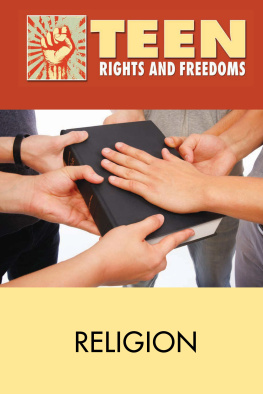
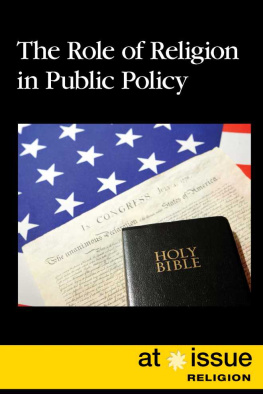
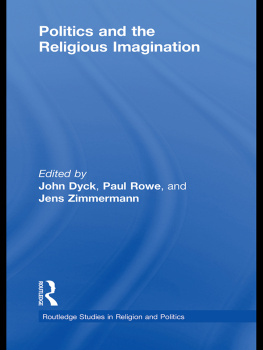
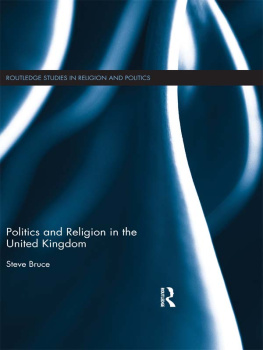
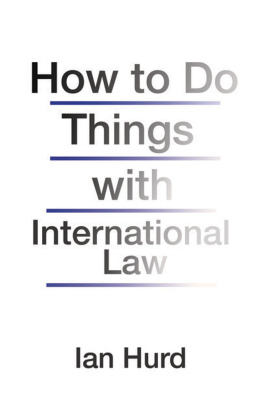
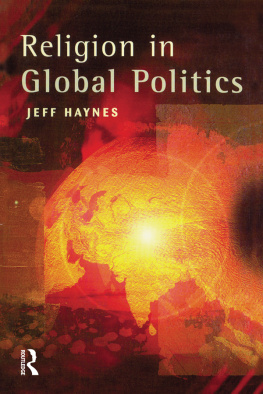
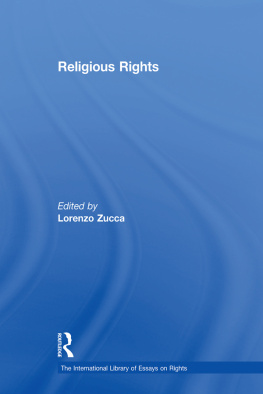
![Blackford - Freedom of religion [and] the secular state](/uploads/posts/book/167779/thumbs/blackford-freedom-of-religion-and-the-secular.jpg)
